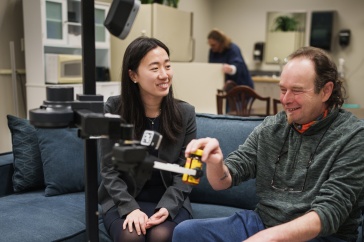
Professor Don Robin in his office in Hewitt Hall
More Americans died from drug overdoses in 2016 than were killed in the Vietnam War. Of those deaths, some 40 percent involved opioids legally prescribed for pain relief. Now, with the support of a gift from Jayne “Kerry” Eastman Chandler ’84, UNH neuroscience professor Don Robin is studying an innovative treatment for chronic pain and addiction that doesn’t rely on medication.
For Robin, chair of the department of communication sciences and disorders in the College of Health and Human Services, the research is the next step in a decades-long career spent exploring the science of how to better people’s lives by understanding their brains. Most recently, he has become interested in mindfulness as a way to treat chronic pain and addiction — conditions that have increasingly gone hand in hand.
Robin’s goal is to use brain stimulation in conjunction with acceptance commitment therapy (ACT), which encourages people to embrace difficult feelings rather than avoid them, to help people manage their pain and alter their behavior. Treatment consists of once-weekly 90-minute group sessions over the course of eight weeks.
It’s the opioid work that prompted Chandler, who has supported athletics, scholarships and academic programs in the past, to extend her giving to UNH and bring Robin closer to his goal. She learned about his research when he made a presentation at the UNH Foundation board meeting in January. As with so many people around the country, Chandler’s life has been touched by the loss that addiction can lead to. She found the idea of a viable alternative treatment to addiction personally compelling.
“Listening to him talk about brain research and addiction — hearing that, it made so much sense. The work he’s doing is unbelievable and needs to be out there.”
“The research on using mindfulness to treat opioid addiction really got to me,” says Chandler, a member of the Foundation’s board of directors. “Listening to him talk about brain research and addiction — hearing that, it made so much sense. The work he’s doing is unbelievable and needs to be out there.”
Chandler’s gift provides seed money for what Robin hopes will become the Institute of Behavioral Health and Neuroscience. The first step: purchasing a brain stimulation unit and recruiting subjects to undergo ACT. He will start with individuals who experience lower back pain before moving on to those with chronic pain and opioid addiction.
Your Philanthropy Creates Possibilities
To make a gift to endow a fund (such as a scholarship or professorship) or to support a program, or if you’re considering a bequest or have other estate planning questions, contact Troy Finn, associate vice president of development: (603) 862-4940; troy.finn@unh.edu.

Robin has assembled a team of faculty members from the communication sciences and disorders, health management and policy, nursing and psychology departments at UNH and from the University of Texas Health Science Center at San Antonio, where he first began this work. Brain scans are set to take place at the Dartmouth Brain Imaging Center in Hanover, New Hampshire, until the brain stimulation unit is set up at UNH.
“If we are able to use stimulation to help patients engage in new positive experiences, then we have a chance at normalizing brain function and their world experiences will change,” says Robin. “Our data shows people are able to reorganize their brains with this type of therapy.”
Originally published in IMPACT Spring 2018
-
Written By:
Jody Record ’95 | Communications and Public Affairs | jody.record@unh.edu
















































